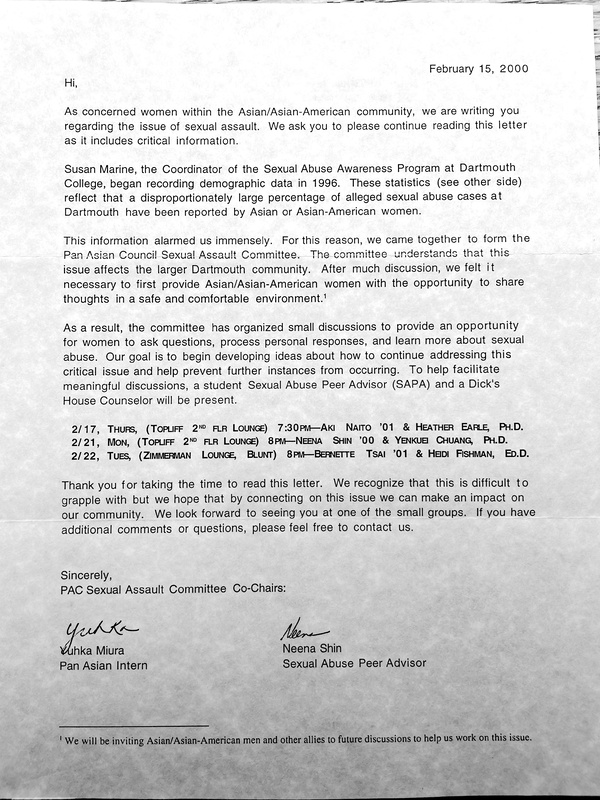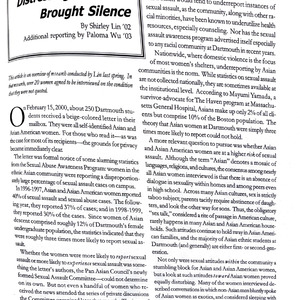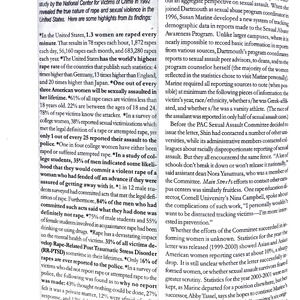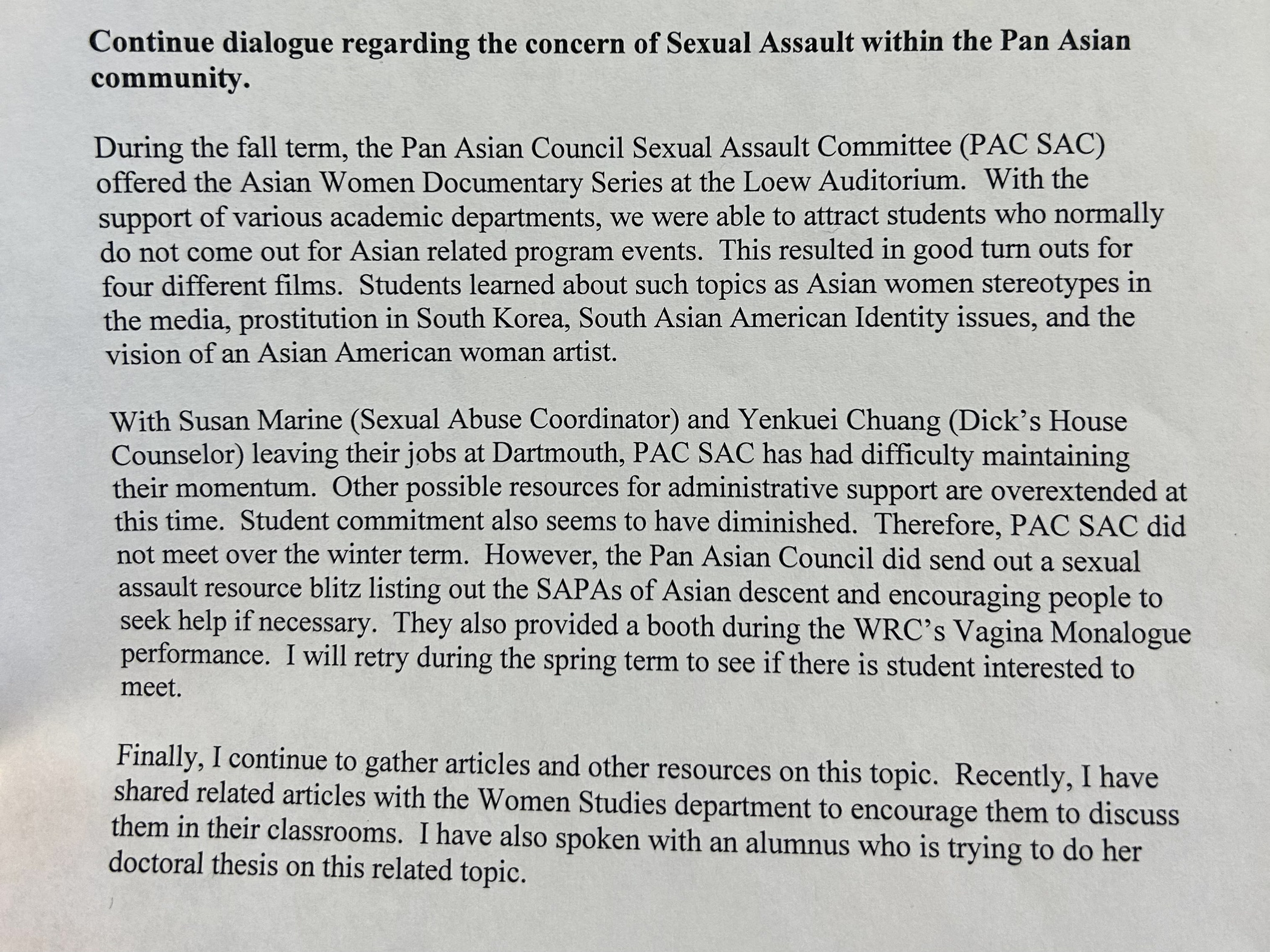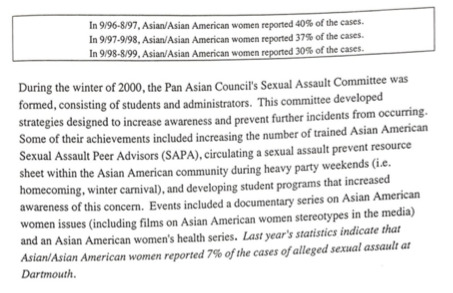Responses to the Report of Sexual Violence Against Asian Women on Campus
After the release of the 2000 SAAP report and other Asian women coming forward about the prominence of sexual assualt on campus, students and faculty responded in various ways.
Susan Marine's Reflection Upon the Impact of her 2000 SAAP Report
– Susan Marine (Combating Sexual Violence in the Ivy League: Reflections on Politics, Pain, and Progress)
I was acutely aware that the data would alarm many within the community, as well as without. I was familiar with the extensive body of literature on the deeply harmful, otherizing phenomena of Asian fetishizing promulgated by White men (Cho, 1997; Mohanty, Russo, & Torres, 1991; Rivers, 1990)... Despite my misgivings that I, as a White woman, was not equipped to interpret or even respond to this phenomenon, I was certain that the numbers implicated a concerning trend that needed to be addressed.
The 2000 SAAP report revealed disproportionate rates of sexual assault against Asian-American women. However, according to Susan Marine, there was a "profound uncertainty of what a meaningful intervention in this issue would be." After the report came out, it became more obvious than ever that dynamics of race and racism undeniably shaped Dartmouth's social culture, bringing to light the experience of Asian women as one disproportionately impacted by sexual violence.
Pan-Asian Council Sexual Assault Committee
Following the report, the Pan Asian Council (PAC) formed its Sexual Assault Committee which sponsored a holistic, well-attended Asian Women's Health series in the spring of 2000. They held space for conversations between students, administrators, faculty, and the community.
On February 15th, 2000, co-chairs of the Sexual Assault Committee, Yuhka Miura ‘00 and Neena Shin '00 wrote a letter of concern to campus. They created space for small group discissions between Asian and Asian Americans and allies to talk about sexual assault on campus.
“Our goal is to begin developing ideas about how to continue addressing this critical issue and help prevent further instances from occurring. To help facilitate meaningful discussions, a student Sexual Abuse Peer Advisor (SAPA) and a Dick's House Counselor will be present.”
— PAC Sexual Assault Committee Co-Chairs, Yuhka Miura ‘00 and Neena Shin '00
Sexual Violence Activism in Student Publications
According to Shirley Lin '02, the Asian and Asian American community was reluctant to discuss the issue of distressing sexual assault rates against women within the community, preventing the committee from reaching critical answers or clear steps forward.
In 2001, Shirley Lin '02 published an article in Asian American student publication Main Street titled "Sexual Assault at Dartmouth: Distressing Statistics Brought Silence.” The article details the PAC Sexual Assault Committee's conversations after the statistics' release, discusses underreporting of sexual assault amongst Asian women, and analyzes the distressing phenomenon of Asian stereotypes and fetishization of Asian women as an underlying root cause.
This article asks the essential question surrounding these statistics: "Are Asian and Asian American women more likely to be assaulted, or just more likely to report sexual assault?" Lin '02 responds that Asian and Asian women tend to underreport sexual assault incidents, a fact corroborated by many studies.
According to Lin, Asian and Asian American women at Dartmouth were victims of broader American stereotypes that fetishized and exotified Asian women:
“Many of the women interviewed described conversations in which non-Asian men bluntly spoke of Asian women as exotics, and considered sleeping with one an end in itself. Mainstream American culture has amply demonstrated its attachment to hurtful stereotypes of Asian women, from the sexually submissive Lotus Blossom to the sexually sadistic Dragon Lady. Given the fact that the U.S. has aggressed in three major wars in Asia in the 20th century and that it is now a preferred customer of the Asian sex tourism industry, it's not surprising that the commodifying "Asian fetish" phenomenon continues to influence non-Asian college men.”
— Shirley Lin '02
In addition, the efforts made by the PAC's Sexual Assault Committee were not as popular as they had hoped. After Marine left Dartmouth, reports of sexual assault had decreased. However, it is still unclear to this day whether they decreased due to the effectiveness of PAC's response programs, or an increased fear of the visibility and consequences of reporting an incident.
Community Campus Reports Over The Years
According to annual reports by Nora Yasumura, assistant dean of student life and advisor to Asian/Asian-American students, Yasumura and Dick’s House counselor Yenkuei Chuang supported student groups who aimed to reduce sexual violence against Asian and Asian American women. These organizations included the PAC sexual assault committee, AASPIRE (an Asian women’s group), and the 2001 Asian Women’s Health series, which focused on Asian women’s identity issues, health issues, and topics of relationship abuse.
The Asian American Community Campus Report displayed an overview of campus life for Asians and Asian Americans at Dartmouth, including the sexual assault statistics against Asian/Asian-American women from the 2000 SAAP report. This report, shown at a 2002 conference on Asian Pacific Americans in higher education, discusses actions taken by the Pan Asian Council's Sexual Assault Committee's after the release of the 2000 SAAP report. These initiatives included increasing Asian Americans' knowledge about sexual assault, increasing the availability of resources about sexual violence specific to Asians and Asian Americans, a documentary series discussing Asian fetishization, and the Asian American Women's Health series mentioned previously.
"This committee developed strategies designed to increase awareness and prevent further incidents from occurring....Last year's statistics indicate that Asian/Asian American women reported 7% of the cases of alleged sexual assault at Dartmouth."
2002 Asian American Community Campus Report, 2002 APA in Higher Education Conference at Columbia University
The 2015 “AAU Campus Climate Survey on Sexual Assault and Sexual Misconduct Report” does not include a category for Asian or Asian American in its race/ethnicity variable values. This was an overt instance of the distressing prevalence of Asian and Asian American erasure, rendering an entire ethnic, cultural and racial group invisible in the campus climate.

